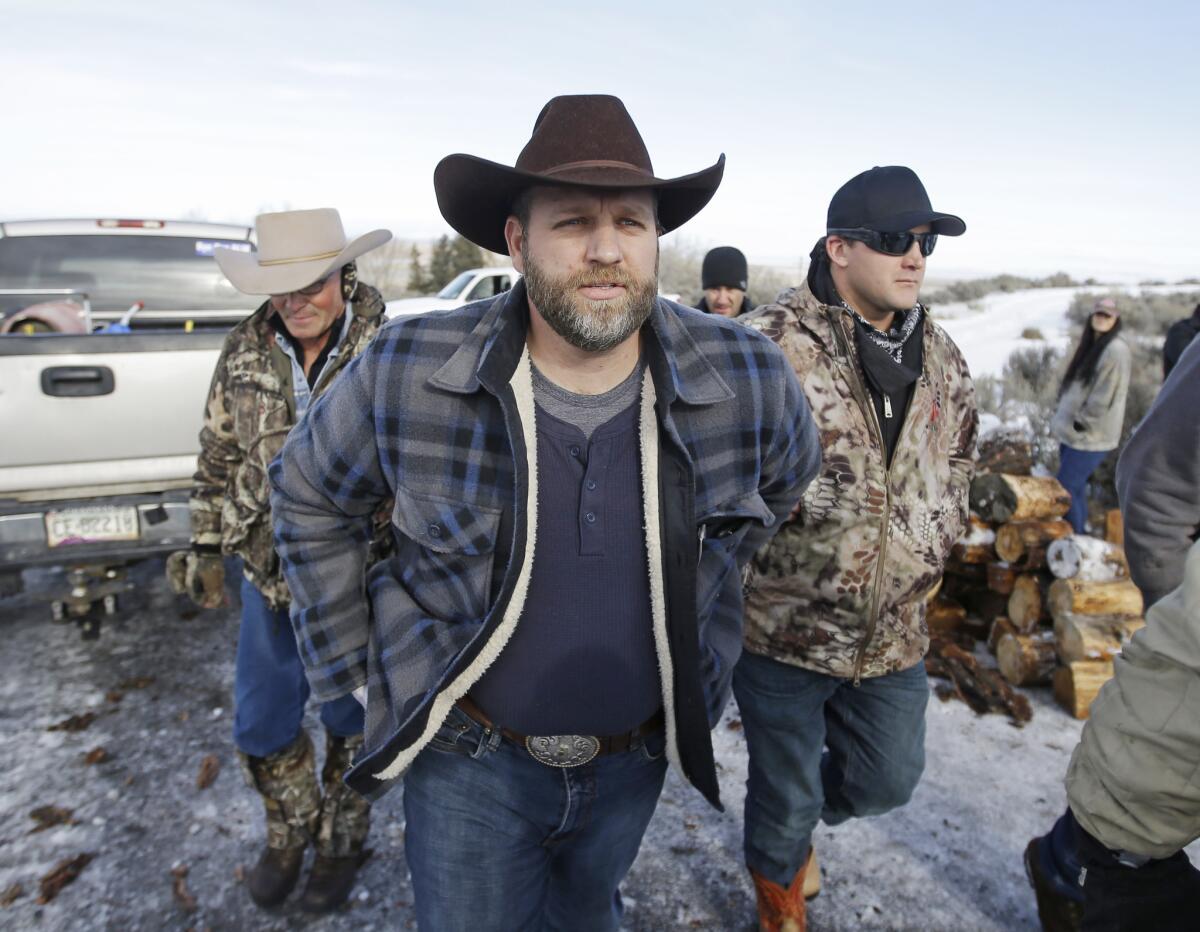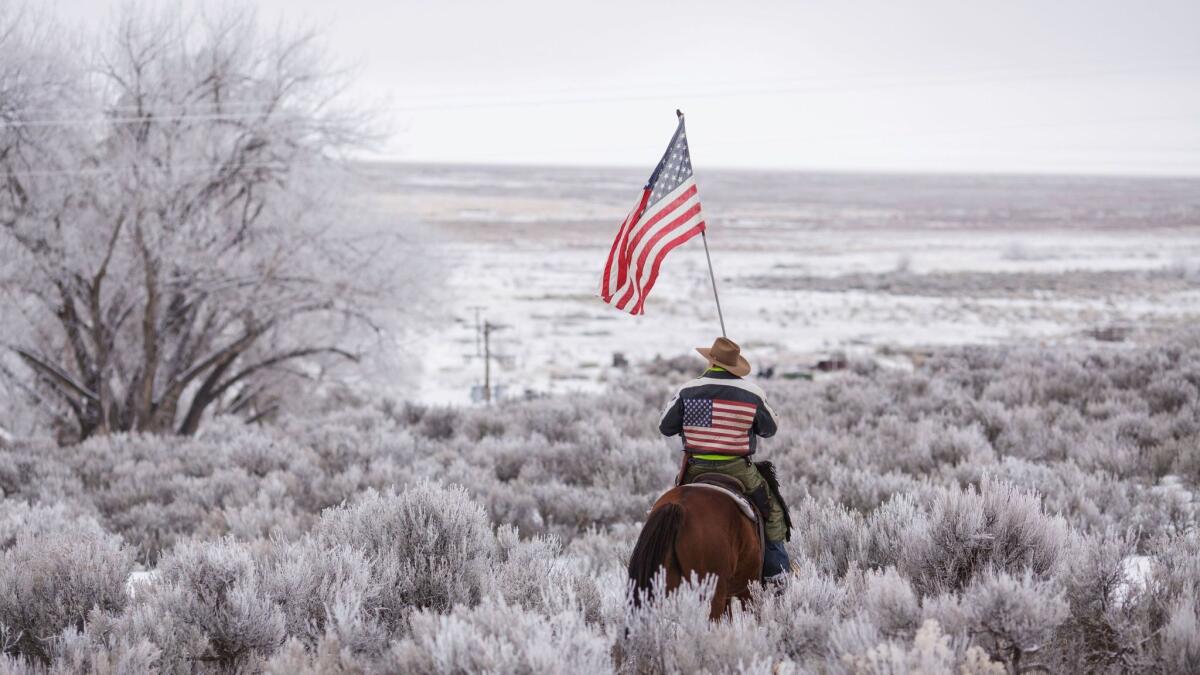How the government lost its case against the Oregon occupiers

- Share via
What happened at the Malheur National Wildlife Refuge earlier this year was no whodunit.
Many of the men and women in the 41-day protest in rural Oregon were filmed and photographed taking over and occupying the facility. Some were even captured there. Some had guns.
At trial in federal court in Portland -- where seven defendants stood accused of weapons charges and conspiracy to intimidate federal workers -- some presented legal theories that experts called wrongheaded and laughable.
All this, in a federal legal system in which the overwhelming majority of defendants charged with a crime are convicted.
Yet if there is a single sentence that sums up the disastrous loss that federal prosecutors experienced in Oregon on Thursday — when all seven defendants were found not guilty — it’s the story of Kenneth Medenbach, who was also charged with stealing government property:
“My client was arrested in a government truck, and he was acquitted of taking that truck,” said defense attorney Matthew Schindler, who still sounded in disbelief Friday morning.
Thursday’s acquittal brought celebration among the occupation’s right-wing supporters and sent shock waves through the legal profession. Three of the seven defendants chose to represent themselves, and the government’s six-week trial had largely been viewed as an easily winnable case.
Bundy’s attorney, Morgan Philpot, said if his client and fellow protesters believed they were pursuing a legal process, they couldn’t have been criminally intending to intimidate federal workers.
When a television reporter first informed Lewis & Clark criminal law professor Tung Yin of the not-guilty verdict, Yin responded, “Wait — what?”
“Look at the indictment and the list of charges,” Yin told the Los Angeles Times on Friday, noting that the government’s evidence included video footage and social-media posts from occupiers about their armed takeover of the refuge.
“You’ve got these yahoos taking videos of themselves with their guns probably, and they’re clearly on a federal facility by their own admission, so that seemed like proof beyond any doubt of their factual guilt,” Yin said. “That’s why it seemed to me it would be a slam-dunk case.”

Yet the government’s case was more challenging than it seemed. Defense attorneys in the case say that prosecutors became overconfident, electing not to file lesser charges that would have resulted in easier convictions — and likely little, if any, jail time.
The occupation began in January as a protest against the imprisonment of two Oregon ranchers who had been convicted of setting fire to federal lands.
The leaders, which included brothers Ammon and Ryan Bundy, are far-right land-rights advocates who believe in arcane legal theories that the federal government doesn’t have the constitutional authority to own federal wildlands.
The weeks-long occupation, which was covered widely in the national media and drew protesters from across the U.S., ended after state and federal law enforcement arrested the occupation’s leaders on a nearby highway. One leader, LaVoy Finicum, sped away in a truck, and police shot and killed him after he got out of the vehicle and reached for his gun, officials said.
After the occupation was abandoned, dozens of guns and thousands of rounds of ammunition were found at the refuge. Charges against many of the occupiers soon followed, with almost a dozen people pleading guilty to related charges before trial.
The most significant of the charges against the occupation’s leaders was a count of felony conspiracy to intentionally intimidate government workers and prevent them from doing their jobs.
The conspiracy count was actually a double-whammy: If the defendants could persuade the jury that no criminal conspiracy had occurred, then they could not be convicted of the accompanying weapons charge — which requires the government to prove the guns had been brought on federal property to commit a crime.
The defendants said they were not trying to intimidate or hurt anyone by occupying the refuge. Ammon Bundy claimed that he was trying to take ownership of the land by way of “adverse possession” — a legal process of gaining ownership of something by occupying it.
That’s an unusual legal argument, and one that prosecutors disputed at trial. But ultimately, the jury agreed that the government was unable to prove the intent required to establish criminal conspiracy.
“All 12 jurors felt that this verdict was a statement regarding the various failures of the prosecution to prove ‘conspiracy’ in the count itself – and not any form of affirmation of the defense’s various beliefs, actions or aspirations,’’ Juror 4 wrote in an email to the Oregonian.
Juror 4 also scolded prosecutors for being overconfident and exuding an “air of triumphalism” and denied critics’ claims that jurors were supporting the defendants’ actions.
“Don’t they know that ‘not guilty’ does not mean innocent?’’ the juror wrote to the Oregonian. “It was not lost on us that our verdict(s) might inspire future actions that are regrettable, but that sort of thinking was not permitted when considering the charges before us.’’
The U.S. attorney’s office in Oregon did not respond to interview requests Friday.
Medenbach’s attorney, Schindler, was stunned by the verdict. His own client had been arrested while driving around in a U.S. Fish and Wildlife truck. Medenbach, a right-wing activist who had been convicted previously for other protests, had even planned on being found guilty.
“His point in this case was to be convicted. His point was to go to the Court of Appeals and make legal arguments about the United States’ ability to own land,” Schindler said. “The notion of being acquitted never entered his mind. I told Ken over and over and over, ‘You’re going to be convicted.’ ”
Yet Medenbach was found not guilty, along with his six co-defendants.
“It’s extraordinary, completely unprecedented, without a doubt the biggest loss for the federal government in the District of Oregon, ever,” Schindler said.
Ammon and Ryan Bundy still face similar charges in Nevada for a 2014 armed standoff with U.S. Bureau of Land Management agents near their father Cliven Bundy’s ranch. But Thursday’s verdict was seen as a ray of sunshine for Ammon Bundy’s Las Vegas attorney.
“When the jury down here hears the full story of what the BLM put the Bundys through,” said Dan Hill, “I expect the same result.”
Twitter: @mattdpearce
ALSO
Leaders of Oregon wildlife refuge standoff are acquitted of federal charges
Opinion: Was the Malheur occupation legal, or did the feds botch the Bundy case?
More to Read
Sign up for Essential California
The most important California stories and recommendations in your inbox every morning.
You may occasionally receive promotional content from the Los Angeles Times.











